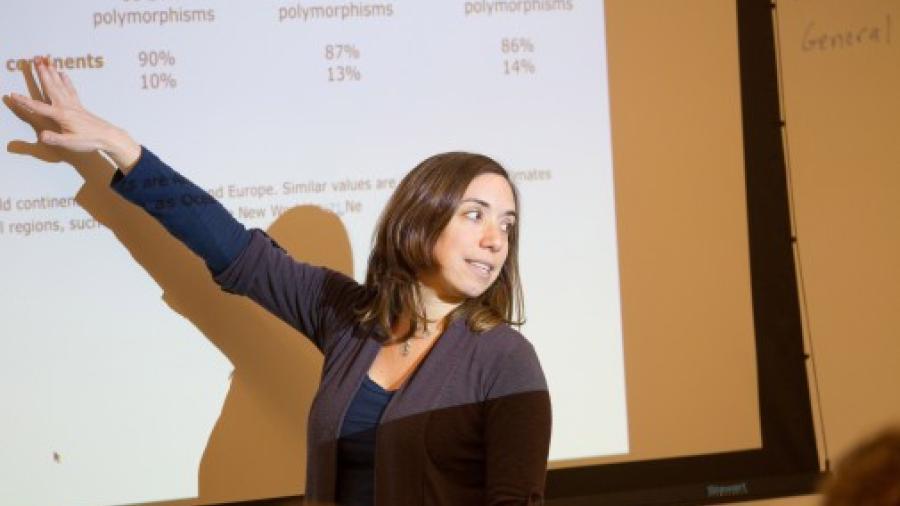Westmont Magazine Boosting the Immune System

Biologist Eileen McMahon McQuade conducts research into autoimmune disorders such as rheumatoid arthritis and diabetes
Since her student days, biologist Eileen McMahon McQuade has studied the immune system. At Eckerd College in Florida, she devoted her undergraduate thesis to sequencing immune genes from the bottle-nose dolphin.
Her doctoral work in microbiology and immunology at the University of North Carolina at Chapel Hill focused on neuro-immunology. She explored immune cell-attracting molecules (chemokines) and their effect on immune cell subpopulations found in mice with diseases induced by toxins or genetic mutations.
During post-doctoral training at Northwestern University in Chicago, Eileen switched to the immunoregulation of auto-immune diseases such as multiple sclerosis. She demonstrated that an immune process (epitope spreading) thought to occur primarily in lymph nodes actually occurs in the central nervous system.
Eileen began teaching at Westmont in 2004 and has continued her research on multiple sclerosis, expanding it to include rheumatoid arthritis (RA). She has discovered a novel strain of mice that develops arthritis spontaneously when about 40 days old (teenage years in mice); she is characterizing its clinical and pathological similarities to humans and identifying the gene mutations responsible.
Students have assisted Eileen in these studies. “At Westmont, teaching and research go together seamlessly,” she says. She values the ability to pursue both activities. Only a handful of students assist with her research, but all biology majors spend a significant amount of time in the lab. “Our curriculum requires all majors to do research,” she says. “In most upper-division classes, students design and conduct independent research projects and learn about research as a profession.”
In assessing her work with RA, Eileen decided she needed to know more about the development of T cells, critical components of the immune system that help the body fight diseases. A researcher at UC San Francisco is studying Type 1 diabetes (another autoimmune disorder), and Eileen wrote and asked to join in his work. Mark Anderson, who holds a medical degree and a doctorate in immunology invited her to his lab in the UCSF Diabetes Center. She spent two semesters and a summer as a visiting assistant professor there.
Eileen studied the autoimmune regulator (AIRE), using tissue from both mice and humans. AIRE helps prevent the immune system from attacking the body; mutated AIRE can cause numerous autoimmune diseases. Anderson’s lab seeks to capitalize on AIRE’s ability to turn off immune responses to treat disease.
AIRE is highly concentrated in the thymus, the organ where T cells learn to recognize the body’s own cells and keep from attacking them. Anderson discovered AIRE in the spleen and lymph nodes of mice. Eileen’s task was to discover the site of these rare, extra-thymic, AIRE-expressing cells (eTAC) in humans, a goal she accomplished. Anderson hopes eTAC will help turn off the autoimmune reaction that causes various afflictions.
Eileen worked with tissue from people with Type 1 diabetes who had donated their organs to science to help find a cure for the disease. “These people left a gift for those who come after them,” Eileen says. “It hammered in the importance of a single experiment and making the most of this human gift.”
“Doing research at a place that attracts some of the best scientists and immunologists in the world was enriching and exciting,” Eileen says. “I loved the vibrancy of the city and having Westmont in San Francisco so close.” She spoke to students at WSF and participated in several activities there.
Eileen met her husband, Jim McQuade, while she lived in San Francisco. He works for Nextant, an energy consulting company, and they expect their first child this spring.